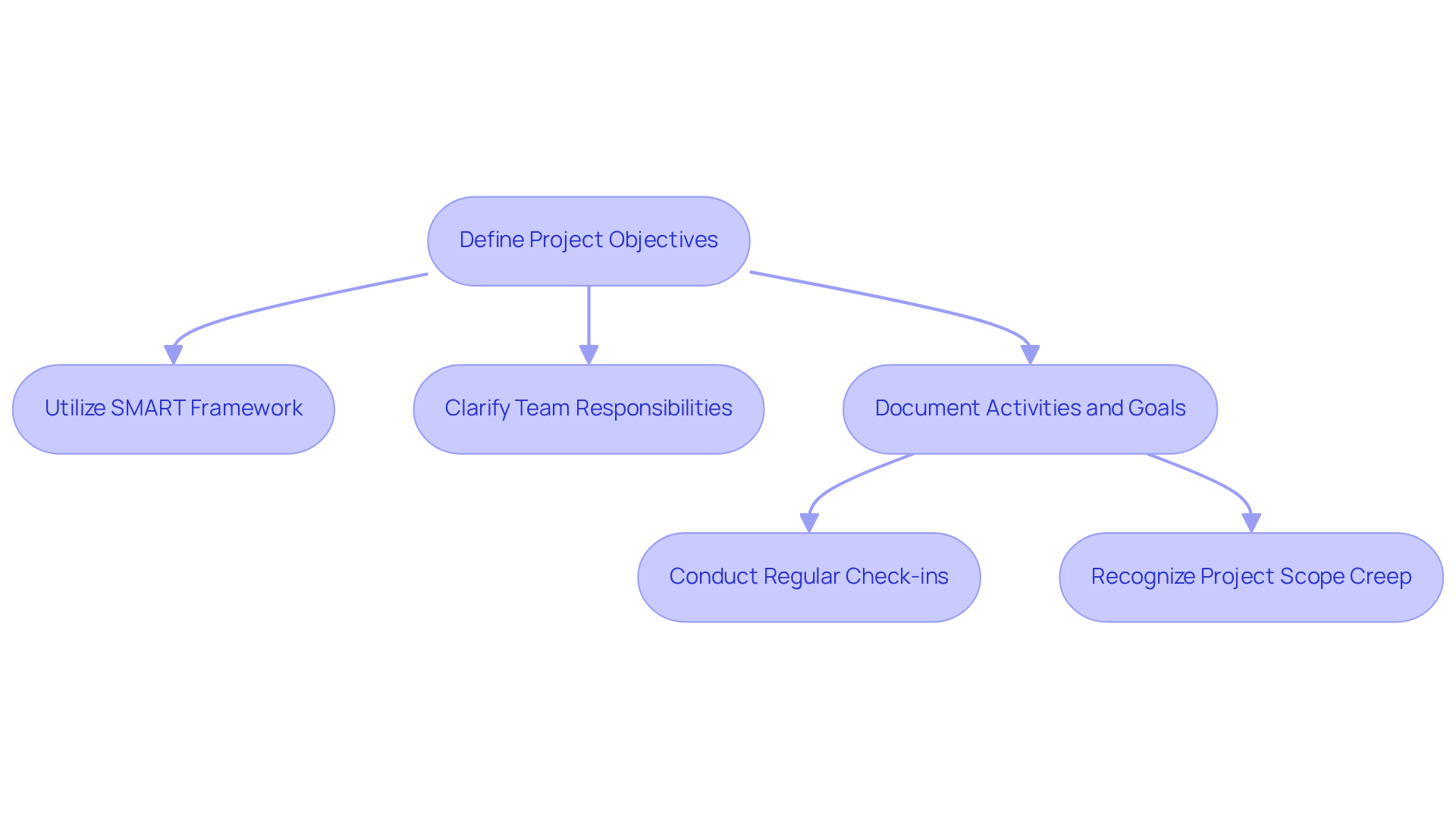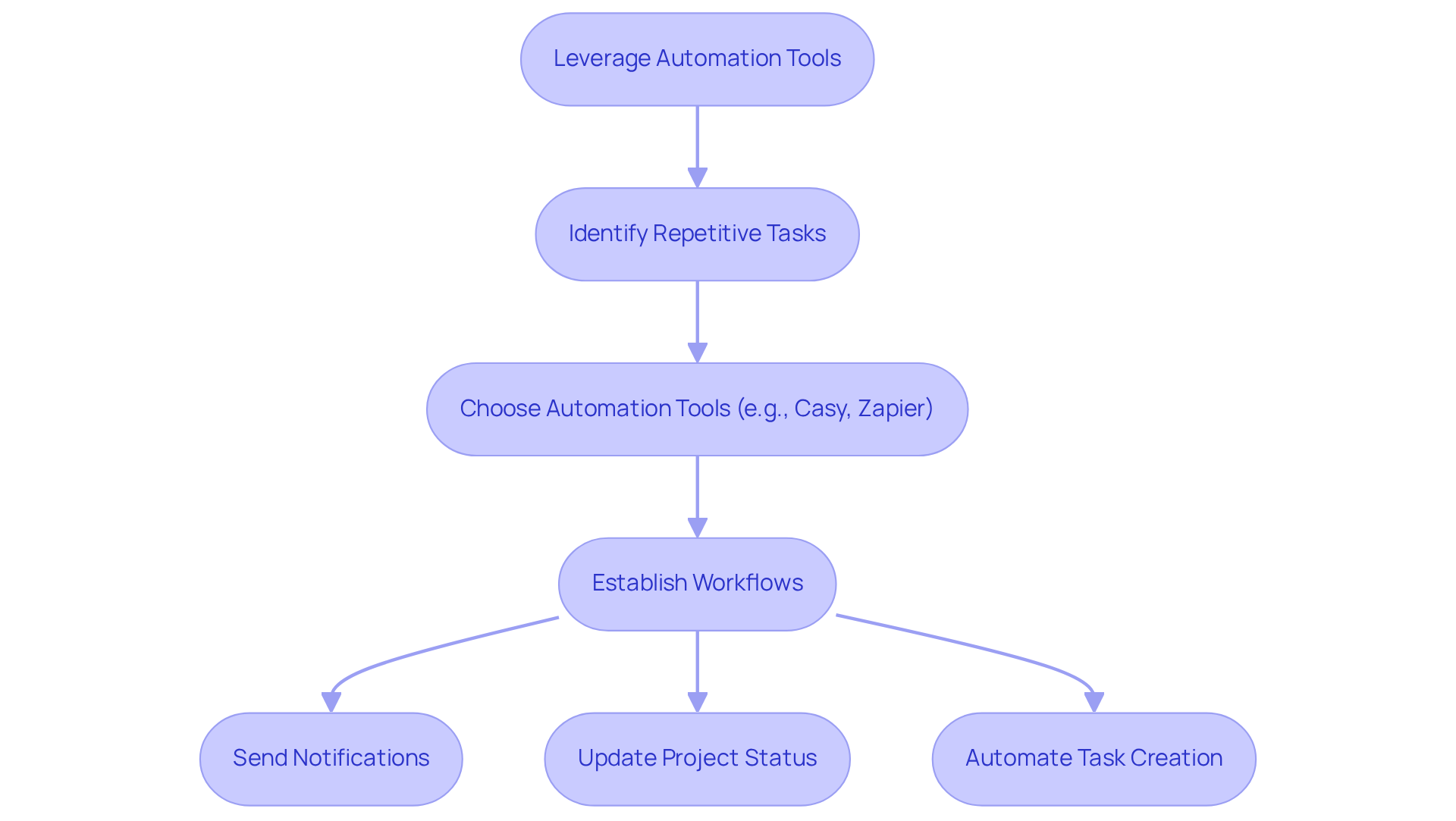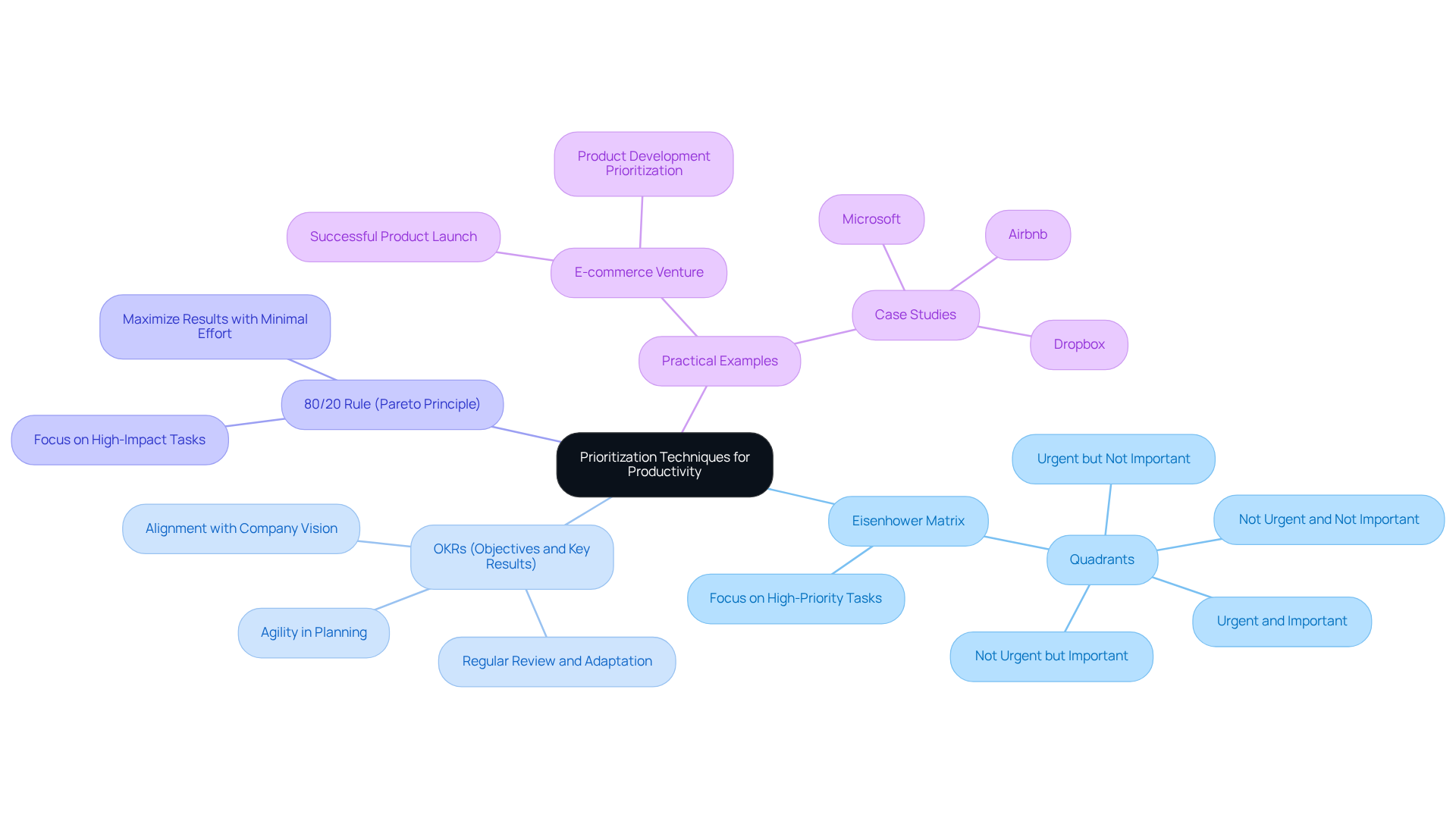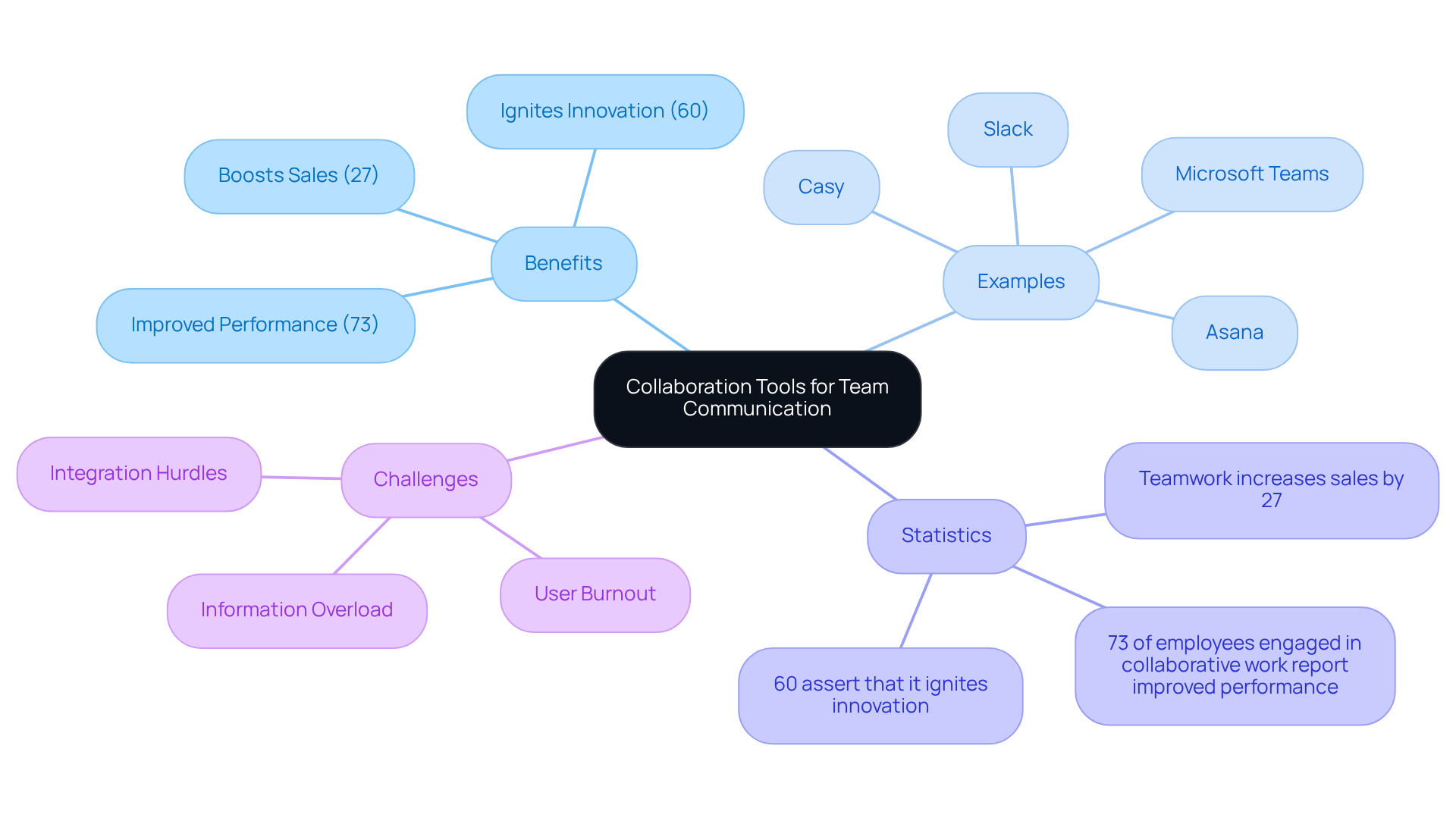Overview
Effective team task management in startups is achievable through strategic approaches such as:
- Setting clear objectives
- Leveraging automation
- Prioritizing tasks
- Utilizing collaboration tools
These methods not only enhance accountability but also streamline processes, improve communication, and ultimately drive productivity. Consider practical frameworks like SMART goals and the Eisenhower Matrix—how might they transform your team's efficiency? By implementing these strategies, you can create a more organized and responsive work environment, fostering a culture of success and collaboration.
Introduction
Efficient task management serves as the backbone of any successful startup, where every decision can significantly impact growth and sustainability. By implementing strategic approaches, startups can transform their operations, enhance team productivity, and foster a collaborative environment that drives innovation. Yet, with the myriad of challenges that new ventures face—such as poor communication and task overload—how can they effectively navigate these hurdles to achieve their objectives? This article explores four essential strategies designed to empower startups to master team task management and unlock their full potential.
Understand the Fundamentals of Task Management in Startups
In new ventures, the efficient management of activities through team task management begins with a clear understanding of the project's objectives and the responsibilities of each team member. Start by defining specific objectives that align with your overall business strategy. Utilize frameworks like SMART (Specific, Measurable, Achievable, Relevant, Time-bound) to establish these objectives. Furthermore, ensure that every team member understands their duties and how their contributions relate to the broader goals. This clarity not only enhances accountability but also fosters a collaborative environment where everyone is aligned toward common objectives. Regular check-ins and updates can help maintain this alignment and adapt to any changes in project scope or direction.
Poor communication is a prevalent challenge for tech startups, often resulting in misunderstandings and missed opportunities. Therefore, documenting activities and goals is essential; studies indicate that founders who fail to record assignments are significantly more likely to overlook them. Additionally, recognizing project scope creep is crucial, as it can complicate workflows and impede progress.
Consider this real-world example: A new company in the tech sector implemented weekly stand-up meetings as part of their team task management to discuss progress on assignments, which significantly improved team communication and accountability, leading to faster project completion times. As Rebecca Arwine, assistant professor of administration at UC's Lindner College of Business, highlights, "What founders concentrate on and when they concentrate on those activities is important for transitioning from the 'wantrepreneur' stage to truly starting a business." By applying these methods, new businesses can enhance their project organization efficiency, ultimately resulting in improved performance and achievement.

Leverage Automation to Streamline Task Management Processes
To streamline management processes, startups must leverage automation tools capable of handling repetitive tasks, including creation, deadline reminders, and progress tracking. Tools like Casy automatically gather essential information from group communications, transforming it into actionable items without the need for manual input. This approach not only saves time but also minimizes the risk of errors associated with manual data entry.
Implementing automation involves establishing workflows that trigger actions based on specific events. For instance, notifications can be sent when an assignment is due, or project statuses can be updated automatically. Additionally, startups can utilize tools like Zapier to connect different applications, automating workflows across platforms.
Consider this real-world example: A marketing startup harnessed automation to manage their social media posting schedule. This enabled the team to focus on content creation rather than logistics, resulting in a remarkable 30% increase in engagement rates.
Are you ready to explore how automation can transform your startup's management processes? Embracing these tools can enhance efficiency and drive significant results.

Implement Prioritization Techniques to Maximize Team Productivity
Startups can significantly enhance their productivity by implementing effective prioritization techniques to manage workloads. One highly effective approach is the Eisenhower Matrix, which classifies activities into four quadrants based on urgency and significance. This framework empowers teams to focus on high-priority responsibilities, ensuring that essential activities receive the attention they deserve while minimizing distractions from less important duties. As Uku Soot notes, the 80/20 rule, or Pareto Principle, emphasizes that concentrating on the 20% of tasks can yield 80% of the results, aligning seamlessly with the principles of the Eisenhower Matrix.
In addition to the Eisenhower Matrix, establishing clear objectives and key results (OKRs) that align with the company's vision is crucial. Regularly reviewing these objectives enables teams to adapt their priorities in response to evolving business needs and market dynamics. For instance, new businesses should consider planning every four to six weeks instead of quarterly to remain agile and responsive to changes.
A practical example can be observed in an e-commerce venture that effectively utilized the Eisenhower Matrix to prioritize its product development activities. This structured approach led to a more focused strategy, culminating in a product launch that not only exceeded expectations but was also completed ahead of schedule. By leveraging prioritization techniques like the Eisenhower Matrix, new businesses can streamline their task management processes and significantly boost overall productivity. However, it is vital to avoid common traps, such as focusing on 'nice-to-have' features rather than addressing major pain points, to ensure that prioritization efforts are effective and aligned with the company's objectives.

Utilize Collaboration Tools to Enhance Team Communication and Coordination
To enhance group communication and coordination, startups must leverage collaboration tools that facilitate real-time interaction and information sharing. Platforms such as Slack, Microsoft Teams, and Asana enable teams to stay connected, share updates, and engage in team task management collaboratively. These tools offer vital features like file sharing, video conferencing, and assignment management, which not only enhance communication but also minimize the risk of miscommunication.
Integrating collaboration tools with project management software, like Casy, greatly enhances team task management and fosters a seamless workflow. Casy captures critical information from discussions to automatically create tasks and set deadlines for effective team task management, allowing team members to effortlessly monitor progress and updates. For example, a software development firm implemented Slack for team communication and integrated it with Casy. This integration resulted in heightened transparency and expedited decision-making processes, illustrating the tangible advantages of effective collaboration.
Moreover, research reveals that:
- 73% of employees engaged in collaborative work report improved performance
- 60% assert that it ignites innovation
Furthermore, Salesforce highlights that teamwork can boost sales by 27%, underscoring the financial benefits of collaboration tools in cultivating a productive work environment, particularly in fast-paced business landscapes. However, emerging businesses should remain cognizant of potential challenges associated with collaboration software, such as information overload and integration hurdles, to ensure they maximize benefits while mitigating risks. The collaboration software market is anticipated to experience significant growth, reinforcing the necessity for startups to adopt these tools.

Conclusion
Effective team task management is crucial for the success of startups, as it directly influences productivity and project outcomes. By prioritizing clear objectives, leveraging automation, implementing prioritization techniques, and utilizing collaboration tools, startups can streamline their processes and enhance team performance. These strategies not only foster accountability and communication but also ensure that teams remain agile and responsive to changing business needs.
The article highlights several key arguments that support the implementation of these strategies:
- Understanding the fundamentals of task management lays the groundwork for effective team dynamics and clarity of roles.
- Automating repetitive tasks minimizes errors and saves time, allowing teams to focus on more strategic initiatives.
- Prioritization techniques, such as the Eisenhower Matrix, help teams allocate their efforts efficiently.
- Collaboration tools enhance communication and coordination, driving innovation and boosting performance.
In conclusion, embracing these effective task management strategies is essential for startups aiming to thrive in competitive environments. By adopting a structured approach to task management, new businesses can not only improve their operational efficiency but also cultivate a culture of collaboration and accountability. Startups are encouraged to explore these practices and tools to unlock their full potential, ensuring they navigate the challenges of growth with confidence and clarity.
Frequently Asked Questions
What is the importance of task management in startups?
Efficient task management in startups is crucial for aligning team activities with project objectives and ensuring that each team member understands their responsibilities, which fosters accountability and collaboration.
How can startups define clear objectives for their projects?
Startups can define clear objectives by utilizing frameworks like SMART (Specific, Measurable, Achievable, Relevant, Time-bound) to ensure that the objectives align with the overall business strategy.
Why is communication important in task management for tech startups?
Poor communication can lead to misunderstandings and missed opportunities, making effective communication essential for successful task management in tech startups.
What steps can be taken to improve communication within a startup team?
Documenting activities and goals, holding regular check-ins, and implementing weekly stand-up meetings can significantly enhance communication and accountability within the team.
What is project scope creep and why is it important to recognize it?
Project scope creep refers to the gradual expansion of project goals and tasks beyond the original plan, which can complicate workflows and impede progress. Recognizing it is crucial to maintain project efficiency.
Can you provide an example of effective task management in a startup?
A tech startup implemented weekly stand-up meetings to discuss progress on assignments, which improved team communication and accountability, leading to faster project completion times.
How can founders transition from the 'wantrepreneur' stage to starting a business?
Founders can transition by concentrating on essential activities and effectively managing tasks, which is vital for establishing a successful business.




